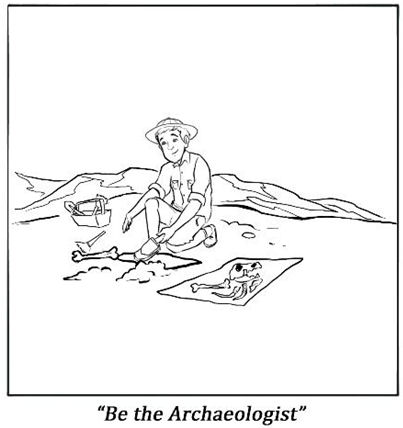
“Be the Archaeologist” —a state of being where we seek to discover
and understand why people (and ourselves) are the way we are.
Chapter 13 presents the concept of understanding another and developing Empathy for them as a critical part of dealing with and healing a long-held animosity, fear, or despair. As part of this process, it is recommended that you Be the Archeologist to discover who another is and understand why they became as they did. Take some time (days if not weeks) to best understand who the other person you currently harbor ill feelings toward is.
Remember that Empathy, understanding, and compassion do not imply approval or agreement regarding their behavior. Answer all these questions below (or make a reasonable guess) to build Empathy and compassion for them. Add your own questions as well.
1. How old are they?
2. What is their gender?
3. What is their physical stature?
4. What was their birth order?
5. How many siblings do they have, and what is/are their gender(s)?
6. What geographic area did they live in early in their lives?
7. What religion, if any, were they exposed to as children?
8. What are their fears?
9. What are their desires?
10. Are they married, divorced, or single?
11. What was and now is their socio-economic status?
12. Have they or are they currently involved with substance abuse?
13. Are they overweight or underweight?
14. What life setbacks and tragedies have they experienced?
15. What gifts and talents do they have?
16. Are they comfortable in their skin?
17. What challenges and problems are they facing with their health?
18. What challenges and problems are they facing with their families?
19. What challenges and problems are they facing with work or lack of work?
20. What are their hobbies and interests?
21. How many children do they have?
22. If they have children, what is their relationship with them?
23. What religious or spiritual inclinations do they have?
24. To what degree do they care about their image and what others think about them?
25. Were their parents abusive to them when they were children?
26. Are their parent(s) alive? If not, how and when did they die?
27. Do they get along with their parents?
28. Why do they respond/react as they do in different circumstances?
29. Were they abused as children?
30. Were their parents married or divorced?
31. Were their parents alcoholics, drug addicts, gambling addicts, or in trouble in any major way, such as in prison?
32. Were they once members of the armed services?
33. Are they shy or outgoing … why so?
34. Are they confident or insecure … why so?
35. Are they currently struggling with a personal issue?
36. Are they in shape or out of shape … why so?
37. Are they good at listening and tolerant of views they disagree with … why so?
38. Do they believe in God?
39. Are they quick to anger … why so?
40. Do they laugh much?
41. Do they enjoy their lives?
42. How do they feel love (see Gary Chapman’s book “The Five Love Languages”)?
43. Do they do better with audio input (listening) or visual input (reading) when it comes to learning and communication?
44. Where might they rate in the categories of Director, Socializer, Thinker, & Relater as detailed in the book “The Platinum Rule” by Tony Alessandra and Michael J. O’Connor?
45. What do you admire about them?
46. Are they their word with commitments … if not, why not?
47. What parts of their character and behavior are due to DNA? What parts are due to their experience?
48. Have they experienced many losses such as deceased family members, careers, or pets?
49. What major disappointments have they experienced?
50. Etc.
Please add your own questions.
Hopefully, as you pursue this process, it will become evident that they could not help but become who they have become. It was inevitable that they would be who they are with our view of NOOT. This is a significant step toward developing Empathy and compassion for them. Empathy is understanding that you would be them if you had the totality of their DNA and experiences. Compassion is having kindness and love toward them. That said, after Empathy must come Boundaries with Consequences, as described in Chapter 7 with the EBC Symbiotic 3 (if it applies, as opposed to those who no longer are in your life).
